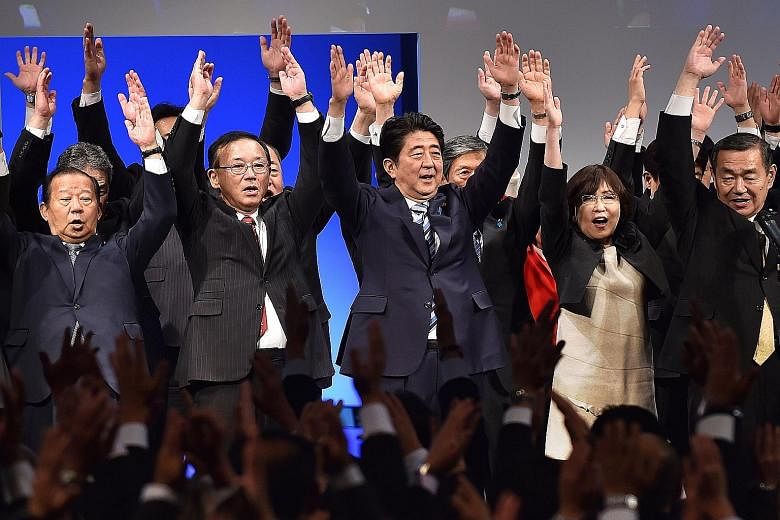TOKYO • It was an irresistible promise: Elect me, I'll bring back Japan's once-soaring economy and restore its battered national pride.
Three years later, Prime Minister Shinzo Abe is facing the enormity of his grand ambitions, and the clock is ticking.
Mr Abe, 60, swept to power in December 2012 with a novel recipe for success, energising a one-time global powerhouse that languished in a decades-long slump, overshadowed by regional rival China.
The take-charge politician trotted around the globe, inking deals for Japanese firms and selling his eponymous "Abenomics" policy blitz.
"I am back and so is Japan," the two-time nationalist leader declared to an American audience.
Mr Abe's call to action - including big government spending and massive central bank monetary easing - had some early successes, as the yen weakened sharply from record highs against the US dollar.
The drop was good news for exporters as corporate profits soared and the benchmark Nikkei 225 stock index doubled to the 20,000 level. A fledgling economic recovery appeared to be taking hold.
But as he marks three years in office on Saturday, the scale of Mr Abe's self-appointed task may be coming back to haunt him. Growth has stumbled, the war on years of deflation is not yet won, and a promised overhaul of the highly regulated economy is far from complete.
"Compared to the magnitude of Abenomics' stimulus, the economy's performance has been feeble," said Mr Ryutaro Kono, an economist at BNP Paribas.
Mr Abe's initial burst of enthusiasm has not been matched by results, some say.
"The first half of (Mr Abe's) tenure showed progress," said Daiwa Institute of Research economist Satoshi Osanai. "The second half has not been so bright."
Mr Abe took power after a rough few years for Japan as it went through a half dozen leaders and saw China overtake it as the world's No. 2 economy. It also suffered the shock of the March 2011 triple earthquake, tsunami and nuclear disasters, which dealt another blow to the economy.
Facing summer elections, Mr Abe's popularity is hovering around 50 per cent.
His bid to bolster Japan's defence posture by diverting from the traditional interpretation of the pacifist Constitution angered neighbours China and the Koreas and sparked rare street protests at home.
Now his legacy hangs on whether he can get tough on overhauling Japan's rigid labour market and tame the spiralling costs of the pension system, observers said.
"After the (summer) election it would be a great opportunity to carry out painful reforms... (they) need to happen now," said Mr Hideo Kumano, chief economist at Dai-ichi Life Research Institute.
AGENCE FRANCE-PRESSE

